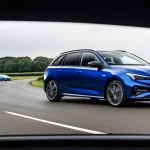Leading Waves of Innovation in UK Automakers’ Digital Customer Experience
Digital transformation in the automotive industry is reshaping how UK automakers engage customers. Leading brands like Jaguar Land Rover, Bentley, and Aston Martin are pioneers in adopting advanced digital technology in the UK automotive sector to enhance the customer journey. This shift stems from an industry-wide recognition that today’s buyers demand seamless, interactive, and personalised experiences.
Key digital innovations transforming the automotive customer experience include online car configurators, virtual showrooms, and connected car apps. These technologies allow customers to tailor their vehicle choices, visualise options remotely, and access real-time updates and services, making the buying process more convenient and engaging than ever before.
Also to discover : How Will the Evolution of UK Automotive Impact Future Transportation Trends?
Drivers for this digital transformation extend beyond customer convenience. Competitiveness, evolving consumer expectations, and the need for efficiency motivate UK automakers’ digital innovation. Integrating digital tools also supports aftersales and maintenance, enabling brands to provide proactive, data-driven service.
Together, these developments position UK automakers at the forefront of the digital innovation curve, setting new benchmarks in both the retail and ownership experience within the automotive industry. Embracing digital technology continues to be crucial for brands aiming to attract tech-savvy consumers and remain competitive in a rapidly changing market.
Also read : What role does innovation play in the UK’s automotive supply chain?
Online Car Configurators and Virtual Showrooms: Personalising the Purchase Journey
Interactive online car configurators have transformed how customers tailor their vehicle choices. By selecting options such as paint colour, interior trim, and technical features, buyers engage deeply with the product before purchase. This level of customisation appeals greatly to today’s discerning consumer who values control and transparency in the buying process.
Virtual showrooms further enhance this personalised experience by allowing customers to explore vehicles remotely. Using high-resolution 3D models and immersive interfaces, shoppers can visualise their configured cars in detail without visiting a dealership. This not only saves time but also broadens access, especially for those in remote areas or during periods restricting physical visits.
Customer feedback consistently reveals that virtual showrooms and configurators improve satisfaction by reducing uncertainty and increasing excitement about the purchase. These digital tools encourage more informed decisions and create a sense of ownership even before the transaction completes. Consequently, the digital car buying experience UK is becoming increasingly characterised by convenience, interactivity, and engagement, driven by technological advancements in the automotive sector.
Connected Car Apps and Digital Customer Service Channels
Digital technology in UK automotive sector increasingly revolves around connected car apps that enhance the ownership journey. Leading UK automakers now provide branded connected apps, such as those from Jaguar and MINI, enabling drivers to monitor vehicle status, check fuel levels, and control features remotely. This digital transformation in automotive industry creates a seamless link between driver and vehicle.
Connected car apps also facilitate digital aftersales by offering remote diagnostics and proactive notifications about required maintenance or potential issues. This preemptive service reduces downtime and prevents costly repairs, improving customer satisfaction. A key advantage for UK automakers’ digital innovation lies in delivering convenience through real-time information, empowering drivers to manage their vehicle health efficiently.
Supporting this ecosystem, digital customer service automotive platforms integrate chatbots, live chat, and online portals to provide immediate assistance. These channels complement traditional services by delivering seamless digital support around the clock. Customers gain quicker resolutions and enhanced engagement, reflecting a broader industry shift toward digital tools that prioritise convenience and responsiveness.
Together, connected car apps and digital service channels exemplify how UK automakers lead in adopting technology to deepen customer relationships and transform the automotive experience.




